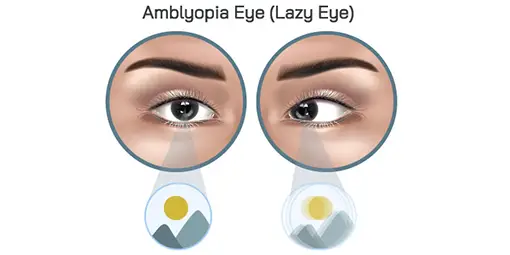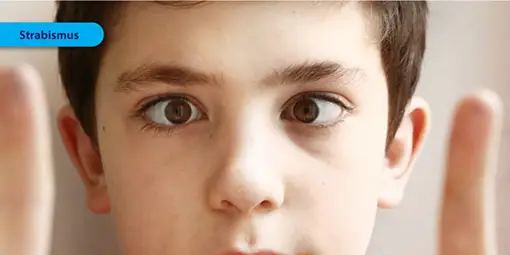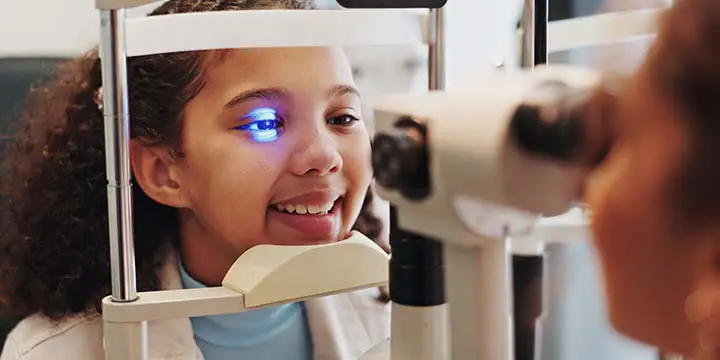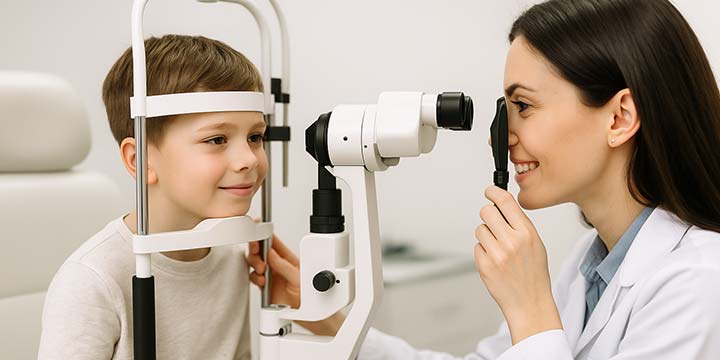Understanding Common Childhood Vision Issues
12-10-2025
As optometrists serving families across Edmonton, one of the most important parts of our work is identifying and managing common vision issues in children. Many parents are surprised to learn that kids often won’t complain about vision problems - they may not even realize anything is wrong. That’s why regular child eye exams are so critical during childhood. Below, we’ll walk you through three of the most common vision conditions we see in kids in Edmonton: myopia, amblyopia, and strabismus. We’ll explain what they are, how to spot them, and what treatment options are available.
Myopia (Nearsightedness)
What Is Myopia?
Myopia, or nearsightedness, is a condition where distant objects appear blurry, while close-up objects remain clear. It usually develops in school-age children and tends to worsen over time, especially during growth spurts.Why Myopia Is A Concern in Edmonton
We’re seeing a steady rise in childhood myopia, which may be linked to increased screen time and less time spent outdoors—factors that are relevant here in Edmonton, where our long winters keep kids indoors for much of the year.Signs Of Myopia To Watch For
- Squinting to see the board at school
- Sitting too close to the TV or holding books very close
- Frequent headaches or eye strain
- Falling behind in class or seeming uninterested in reading
Myopia Treatment In Edmonton
Glasses or contact lenses can correct myopia, but myopia control eyewear options are also available to slow its progression. These include myopia control eyeglasses with Hoya MiYOSMART Myopia Control Lenses, orthokeratology (ortho-k) lenses, specialized soft contact lenses, and low-dose atropine drops—all of which are available at Eye-deology Vision Care. Learn more about myopia management at Eye-deology Vision CareAmblyopia (Lazy Eye)
What Is Amblyopia?
Amblyopia occurs when one eye doesn’t develop proper vision, often due to a difference in prescription or an eye alignment issue. The brain starts to favor the stronger eye, which can lead to long-term vision problems if untreated.Common Causes Of Amblyopia
- Significant difference in prescription between the two eyes
- Strabismus (eye misalignment)
- Cataracts or other obstructions in one eye (less common)
Signs Of Amblyopia To Watch For:
- One eye drifting inward or outward
- Poor depth perception
- Squinting or closing one eye to see
- Trouble with eye-hand coordination
Treatment For Amblyopia
Treatment is most effective when started early, usually before age 7. Options include:- Patching the stronger eye to strengthen the weaker one
- Prescription glasses or contact lenses
- Vision therapy to improve coordination between the eyes
Strabismus (Crossed or Misaligned Eyes)
What Is Strabismus?
Strabismus is a condition where the eyes are not properly aligned—one may turn in, out, up, or down. It can affect depth perception and lead to amblyopia if not corrected.Why Early Detection Of Strabismus Matters
In young children, strabismus can be corrected much more easily than in adults. Untreated, it can lead to permanent vision loss in the affected eye.Signs of Strabisumus To Watch For
- Eyes that appear misaligned, especially when tired
- Tilting or turning the head to look at things
- Complaints of double vision
- Closing one eye in bright sunlight
Treatment For Strabisumus
Depending on the cause and severity, treatments may include: Prescription lenses (especially if farsightedness is a factor) Vision therapy Eye muscle surgery in more advanced cases Many local optometrists in Edmonton work in collaboration with pediatric ophthalmologists to co-manage strabismus cases when surgery is needed.Why Annual Child Eye Exams Are Essential
Many vision issues in children are treatable if caught early, but without regular comprehensive child eye exams, they can go unnoticed for years. In Alberta, comprehensive annual eye exams for children under 19 are covered by Alberta Health Care, making it easy and affordable for Edmonton families to stay on top of their children’s eye health.Eye-deology Vision Care Is Here to Help
If you live in the Edmonton area and have concerns about your child’s vision, or if they haven’t had an eye exam in the past year, book an appointment with one of our optometrists. We’re here to support your child’s visual development at every stage. Your child’s eyes are their window to the world. Let’s keep their vision strong and healthy—starting today. Schedule An AppointmentFYEyes Blog Posts

Myopia - Symptoms, Causes and Treatment
A refractive error that affects the eye's ability to focus on distant objects clearly.

Amblyopia (Lazy Eye) - Symptoms, Causes and Treatment
Amblyopia, commonly known as lazy eye, is a vision disorder that occurs when the brain and the eye are not working together properly.

Strabismus - Symptoms, Causes and Treatment
Strabismus, also known as crossed eyes or squint, is a condition characterized by an inability of the eyes to align properly.

Are There Out-Of-Pocket Fees For Child Eye Exams in Alberta in 2026?
Kids under 19 years of age are still eligible for one annual eye exam partially covered by Alberta Health.

Adult Eye Exams
Our advanced eye exams consist of 25+ modern tests and digital scans to assess eye health, function, and visual acuity.

Child Eye Exams
Give your child a clear future with an annual eye exam from our experienced Edmonton optometrists.

Senior Eye Exams
Maintain your vision through your golden years with gold standard eye care from the optometrists at our Edmonton eye clinic.

Contact Lens Eye Exams
Our eye exams for contact lens wearers include test and digital scans to assess eye health, function, visual acuity, and lens fit.

Diabetic Eye Exams
Managing diabetes requires regular eye exams to ensure that diabetes is not causing irreversible vision loss.

Dilated Eye Exams
Dilating the eyes enables our Edmonton optometrists to see more of the eye so that you many never see less.
Our Edmonton Eye Exams Are Comprised Of 4 Phases Of Evaluation

1. Eye Exam Pre-Testing
Corneal Thickness | Intraocular Pressures | Visual Field
Pre-testing is a detailed process that gathers all necessary information for the optometrist in advance of the optometrist-administered eye examination. This process involves completing a detailed patient history, as well as a series of standard tests. Pre-testing is an essential part of the comprehensive eye exam process, providing valuable information and visuals for both the optometrist and the patient.
More About Pre-Testing »
2. Advanced Diagnostic Testing
Retinal Photography, OCT, Topography
eye-deology Vision Care differentiates itself from other clinics by having the most advanced modern diagnostic specialty testing equipment. Specialty equipment, such as a wide-angle high-resolution retinal imager, Optical Coherence Tomography (OCT), Humphrey Visual Field Analyzer and corneal topographer, ensures that patients receive the best comprehensive eye care.
More About Advanced Testing »
3. Optometrist Examination
Health Assessment & Disease Diagnosis
eye-deology Vision Care Edmonton optometrists perform a multitude of tests and assessments to evaluate ocular health, eye coordination, and visual acuity. In addition, they also evaluate the results of the tests and scans performed during pre-testing. As part of patient education, our optometrists also take the time to show and explain results to patients.
More About Doctor Exam »
4. Eye Glass Consult
Prescription | Lens Selection | Digital Fitting
If you require corrective lenses to improve your vision, our licensed opticians will customize their fit to your unique attributes, needs, lifestyle, and budget. Our opticians are happy to provide you with information about the latest eyeglass frame and lens technologies available so you can make informed decisions and begin seeing and looking your best.
More About Eyewear Consult »